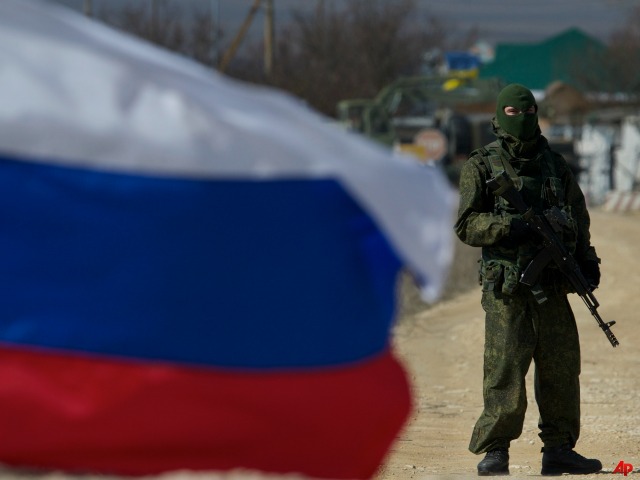
Lithuania’s President Dalia Grybauskaite told Lithuania National Radio and Television (LRT) Russia is a “terrorist state” and urged the European Union to do more to help Ukraine against Russian aggression.
“Lithuania is one of the countries that recently walked a difficult road towards the restoration of independence,” she said. “We know that today Ukraine is fighting for peace in Europe, for all of us. If a terrorist state that is engaged in open aggression against its neighbor is not stopped, then that aggression might spread further into Europe.”
Grybauskaite will meet with Ukraine officials next week in a visit to Kiev. Lithuania, formerly controlled by the USSR along with the other Baltic states, provided necessary aid to Ukraine since Russian hostility started in March with the annexation of Crimea. The government sent “tens of thousands of euros in aid to Kiev” and treated “wounded Ukrainian soldiers.”
“Political, humanitarian and military support is needed for this country, these people, who chose the democratic path, who chose to run their country themselves, who decided on the direction for their country. i.e., the European Union, for them to be able to do that without pressure, without military intervention and aggression,” Grybauskaite said.
She added: “Lithuania, just like other European countries, realizes that peace must be fought for, peace must be defended, independence and sovereignty are untouchable, every nation has the right to have their own state and nobody can dictate them, be it a small or a big country. Nobody can dictate the way they should live. We must clearly state this to the Kremlin, the Russian leadership that such actions will never be tolerated.”
Lithuania’s Prime Minister Algirdas Butkevicius told Ziniu Radijas news radio the situation in Ukraine continues to decline.
“I see no optimism and I can say that the situation in eastern Ukraine continues to deteriorate sharply,” he said. “By recognizing the results of the so-called elections, Russia is creating a new reality, i.e., “a new Transnistria.” He continued, “We see Russian military convoys crossing the border and moving westwards to the area controlled by separatists. And I think this movement means Russia wants to expand territories controlled by separatists.”
Ukraine’s parliament ousted President Viktor Yanukovych in February. Pro-Russian separatists in east Ukraine, where the majority of the population speaks Russian, immediately declared independence from the new pro-West government in Kiev. Numerous reports showed Russian troops on Ukraine’s border and Russian soldiers in the east. Ukraine held presidential elections on May 25, but the pro-Russians did not allow citizens to vote. Videos revealed Chechen fighters from Russia in east Ukraine on the same day.
These breakaway regions held their own elections in early November. Alexander Zakharchenko was declared the new prime minister of the “Donetsk People’s Republic.” Donetsk and Luhansk, the other breakaway regions, also held parliamentary elections. Kiev is concerned these elections could cause east Ukraine to become another post-Soviet “frozen conflict” zone such as Transnistra, which Butkevicius mentioned in his comments.
Transnistria is a strip of land between Moldova and Ukraine. It declared independence in 1990 from Moldova since the residents did not want to breakaway from the USSR. A war lasted between March 1992 – July 1992 when Russia, Moldova, and Transnistra signed a ceasefire agreement. It is unrecognized by the majority of countries but is an independent republic with its own government. The Organization for Security and Cooperation in Europe (OSCE) said Transnistra, Nagorno-Karabakh (South Caucasas), Abkhazia (Georgia), and South Ossetia (Georgia), are post-Soviet “frozen conflict” zones. These countries witnessed armed conflicts, but did not end with a peace treaty. Non-Soviet “frozen conflicts” include China and Taiwan, North and South Korea, and Cyprus and Turkey.
Russian Deputy Prime Minister Dmitry Rogozin visited Transnistra in May to celebrate May Day. He returned with a petition to join the Russian Federation. Rogozin caused more problems when he threw a fit on Twitter because Romania and Ukraine would not allow his plane to fly in their airspace. His flight was sent back to Chisinau where Moldovan officials searched his plane and “seized a list of names during the search and was analyzing them.” He tweeted out a picture of the alleged petition with Moldovan secret services.
Rogozin managed to anger NATO when he told Romania, a NATO member, he would fly back in a UT-160, which is a Russian jet bomber. After he arrived in Moscow, he said, “Yes, gentlemen, Romanians, we’ll soon all explain who you are and what we think about you.”

COMMENTS
Please let us know if you're having issues with commenting.